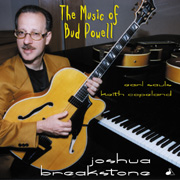






|
 |
Joshua Breakstone -
Music of Bud Powell
DTRCD - 172
Tracks
1. Tempus
Fugit
2. Una Noche Con Francis
3.
Strictly Confidential
4. Elegy
5. Celia
6. Un Poco
Loco
7. Sub City
8. Time Waits
9. Comin' Up
10. The
Scene Changes
Total Time
(56:14)
|
This is my third CD for
Double-Time Records, and the second dedicated to the compositions of a
great jazz pianist. In the case of Let's Call This Monk! (Double-Time
Dtrcd-121), that pianist was Thelonious Monk. Monk's's compositions are
original, ingenious, readily identifiable- a world of their own really,
and so much so, that his playing, even at its most luminous, has been
somewhat overshadowed by the ubiquitous presence of his compositions
within the standard jazz repertoire.
Here we pay tribute to
Bud Powell, who is generally remembered in just the opposite way from
Monk- as a soloist first. It wasn't until I began assembling the music for
this CD that it dawned on me just how prolific a composer Bud Powell
really was. Here we have ten of his compositions, representing some of his
more widely known pieces, as well as a few lesser known items- ten songs,
despite the absence of such widely known items as Dance of the Infidels,
Bouncing With Bud, Parisian Thoroughfare, John's Abbey, Oblivion, So Sorry
Please, Webb City, and Wail (also known as Fool's Fancy and co-authored-
as with Strictly Confidential, which appears here- by trumpeter Kenny
Dorham). There are at least another dozen beyond these which I would love
to have included but, alas, for lack of time (chief among them being Blue
Pearl and I'll Keep Loving You). I chose material that speaks to me
personally, and which also serves to demonstrate the scope of Bud's
writing, both in terms of approach and emotional range. When we hear a
song like Tempus Fugit (or Un Poco Loco, Oblivion, etc) and then Comin' Up
(or Buttercup or Borderick) we can't help but ask ourselves if they could
really have been written by the same person- Bud could sound so childlike,
playful, innocent, and at other times so possessed, driven, intense.
He was emotional. In his songs we get a glimpse of some of the
people he loved- Celia (his daughter), Buttercup (ladyfriend), Francis
(friend, advocate, protector). Bud was deep.
When we make a
recording that's a dedication, we in no way attempt to duplicate or
imitate the person to whom we're paying tribute. In all cases, such an
attempt would be, I think, ill-advised, and in the case of Bud Powell,
insane. What we've tried to do here is express our love and appreciation
of Bud's genius by playing his music in our own way. And in achieving this
end I want to thank and acknowledge my fellow musicians.
I've
performed with bassist Earl Sauls since the early '80s (he can also be
heard on my first two recordings, Wonderful! with Barry Harris, and 4/4+1
with Kenny Barron). He's performed with the likes of Howard McGhee, Pepper
Adams, Joe Albany, Stan Getz, and Warne Marsh among many others. He gets
that sound I love- a big natural bass sound.
Keith Copeland,
son of the late trumpet great Ray Copeland, has appeared on more than
eighty recordings (including three of mine- Echoes, with Pepper Adams and
Kenny Barron, Evening Star with Tommy Flanagan and Jimmy Knepper, and
Sittin' on the Thing with Ming, with Kenny Barron and Ray Drummond), and
is a leader in his own right, with five recordings under his own name to
date. Past associations have included Johnny Griffin, George Russell, The
Heath Brothers, Sam Jones, Billy Taylor, Hank Jones, and Frank Foster-to
mention just a few among hundreds. Keith is also widely known as an
educator and clinician. His book, "Creative Coordination for the
Performing Drummer" (Carl Fischer) is regarded as a text. Since Feb.
of '93, Keith's been living in Frankfurt, Germany and is a tenured
Professor at the Hochschule fur Musik in Cologne.
Our
rendition of Celia here is for Celia Curtis, who is as lovely as this
song. This recording is dedicated to the genius of Bud Powell. And to you,
Nathalie- without your love this recording would never have been
made.
Joshua
Breakstone |